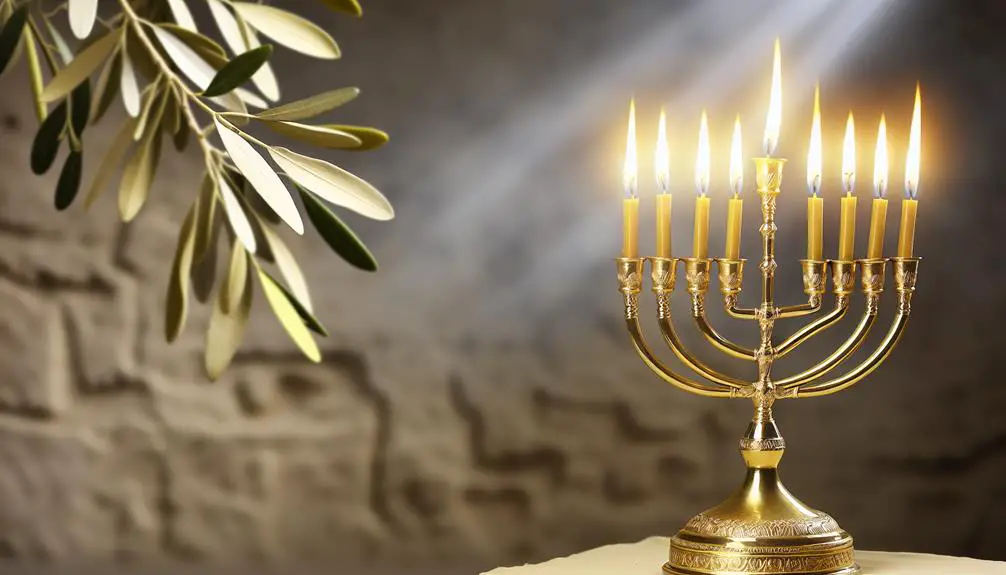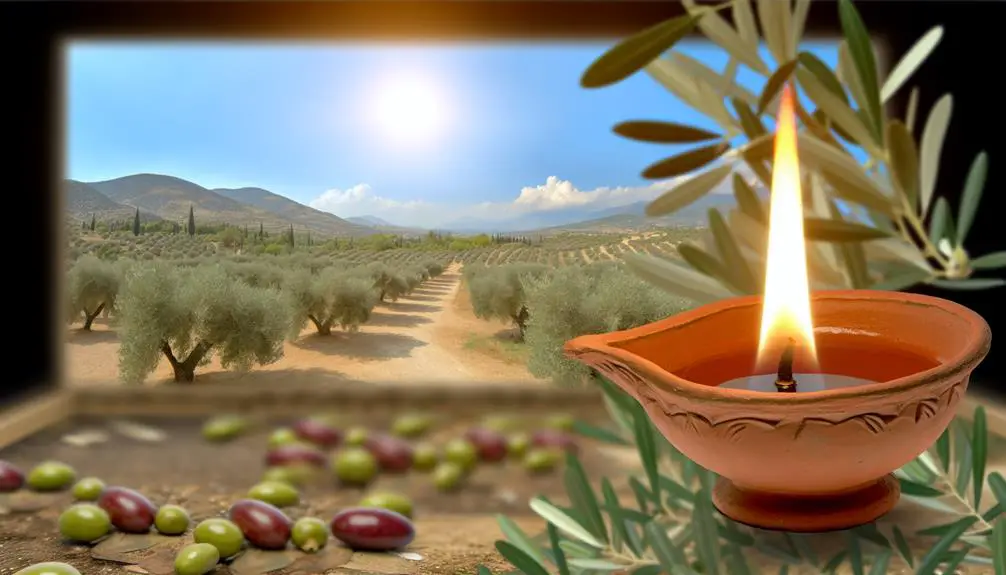Uncover the profound symbolism and uses of olive oil in the Bible, revealing insights that could transform your understanding of sacred texts.

Olive Oil in the Bible
Olive oil in the Bible is not just a drop in the ocean; it's a vast sea of symbolic significance and practical use that you've likely overlooked. From anointing kings and priests to serving as a medium for healing, this precious commodity threads through sacred texts, illuminating its deep spiritual and historical importance.
As you explore its roles in rituals, offerings, and even Jesus' parables, you'll uncover layers of meaning that could shift your understanding of biblical narratives. So, why stop now, when the surface has barely been scratched?
Key Takeaways
- Olive oil symbolized purity, healing, and divine anointment in biblical narratives.
- It was crucial for ritual uses, including cleansing ceremonies and anointing kings and priests.
- Olive oil's healing properties were integral to ancient healthcare and religious practices.
- Its significance extended to maintaining a connection between the divine and earthly realms through illumination and sacrifices.
Historical Significance

Olive oil holds a pivotal role in biblical narratives, serving not only as a dietary staple but also symbolizing purity, healing, and divine anointment throughout ancient texts. Its culinary uses are extensively documented, underpinning its essential role in daily life. You'd find it in myriad preparations, from anointing foods for flavor to serving as a cooking medium that transcended simple sustenance, embedding itself into the cultural fabric of societies.
This widespread use fostered the development of trade routes specifically designed to facilitate the exchange of olive oil, which, in turn, catalyzed economic and cultural exchanges between disparate regions.
These trade routes weren't merely conduits for commerce but also vectors for the diffusion of ideas, culinary practices, and religious beliefs. Through them, olive oil's significance was disseminated, enriching the tapestry of civilizations connected by these ancient highways. Your understanding of its historical importance is incomplete without appreciating how these networks transformed olive oil from a local commodity to a global phenomenon, deepening its religious and cultural imprint across the Mediterranean and beyond.
Symbolic Uses in Rituals
Understanding the historical significance of olive oil paves the way to appreciating its profound symbolic roles in religious rituals and ceremonies. In the context of ancient practices documented within the Bible, olive oil's usage in cleansing ceremonies and baptismal rites stands as a testament to its deep spiritual and purifying connotations.
In cleansing ceremonies, olive oil served not only as a practical substance for physical purification but also symbolized a deeper, spiritual cleansing. It represented a purification process, preparing individuals for sacred encounters or for entering holy places. This dual purpose highlights the substance's intrinsic value in bridging the corporeal with the spiritual, marking a transition from the profane to the sacred.
Similarly, in baptismal rites, olive oil took on a symbolic dimension of sanctification and consecration. The act of anointing with oil during these rites signified the individual's introduction into a spiritual life, imbuing them with grace and divine favor. This practice underscored the belief in olive oil's capacity to confer protection and blessings, further cementing its role in the spiritual journey of the faithful.
Through these rituals, olive oil transcended its material value, embodying themes of renewal, purification, and divine acceptance. Its enduring presence in these sacred rites speaks to the profound spiritual significance it held within biblical times.
Anointing Kings and Priests

Historically, kings and priests were often anointed with olive oil, a practice that symbolized their divine appointment and the conferral of spiritual authority. This tradition, deeply embedded in ancient rituals, underscored the unique role these figures played within their communities. Olive oil, revered for its purity and durability, wasn't chosen at random; its intrinsic qualities were believed to reflect the sanctity and everlasting nature of the offices it consecrated.
Coronation ceremonies and the ordination of priests frequently featured olive oil as a central element. In these rites, the act of anointing wasn't merely ceremonial but served as a tangible sign of divine favor and empowerment. The oil, often perfumed and prepared following sacred formulas, was applied to the head in a deliberate, ritualistic manner, signifying the individual's readiness to shoulder their divine responsibilities.
Moreover, the integration of olive oil extended beyond the initial anointing. It played a pivotal role in the maintenance of priestly garments, ensuring these vestments remained not only physically pristine but also spiritually charged. This ongoing use of olive oil underscored its importance in sustaining the sanctity and authority of these spiritual leaders, reinforcing the idea that their roles weren't just of earthly significance but were ordained by higher powers.
Olive Oil for Healing
You'll find that olive oil's significance extends beyond anointing rituals, playing a pivotal role in ancient healing practices.
Biblical texts reference its use in various therapeutic contexts, illustrating its esteemed place in scriptural healing narratives.
This exploration into olive oil's medicinal applications offers insights into its revered status in ancient societies.
Ancient Healing Practices
Olive oil, revered for its therapeutic properties, played a pivotal role in ancient healing practices as documented in biblical texts. It wasn't merely a substance for anointing but was integral in herbal concoctions, enhancing the efficacy of medicinal herbs.
Its dietary roles were equally critical, believed to maintain health and prevent diseases. The ancients recognized its antioxidant and anti-inflammatory properties, employing it both externally for wounds and internally for digestive and respiratory issues.
This multifaceted use underlines olive oil's esteemed status in ancient healthcare, serving as a cornerstone in the holistic approach to medicine. Its application wasn't random but deeply rooted in empirical observation and knowledge, passed down through generations, highlighting the sophisticated understanding of natural remedies in biblical times.
Scriptural Healing References
Building on the understanding of olive oil's role in ancient healthcare, we now explore its specific references in biblical texts as a medium for healing. Olive oil's significance extends beyond nutritional value, aligning with dietary laws and embodying prophetic symbolism. Its application for healing purposes is deeply rooted in scriptural narratives, offering a multifaceted perspective on its spiritual and physical significance.
- Olive oil's use in anointing the sick reflects its role in spiritual healing and purification.
- Dietary laws often reference olive oil, highlighting its importance in maintaining bodily health.
- Prophetic symbolism associates olive oil with joy, healing, and the presence of the Holy Spirit.
- Scriptural narratives frequently depict olive oil as a healing agent, underscoring its therapeutic properties.
Illumination in the Tabernacle

You'll find that the role of olive oil extends beyond the anointing and healing rituals, deeply into the very illumination within the Tabernacle, highlighting its multifaceted significance.
Ancient lighting methods employed this sacred oil not merely for practical purposes but as a symbol of enlightenment and divine presence.
The significance of this sacred oil in such a context underscores its essential role in maintaining a connection between the divine and the earthly realms.
Ancient Lighting Methods
In examining ancient lighting methods, one finds that the Tabernacle utilized olive oil as a principal source for illumination, reflecting its significance in religious and daily life. This practice highlights olive oil's prominence beyond culinary uses, extending to spiritual and functional roles. The choice of olive oil wasn't arbitrary but rooted in its availability, purity, and the quality of light it produced.
Consider these aspects:
- Wick materials: Primarily linen, chosen for its durability and consistent burn rate.
- Fuel alternatives: While olive oil was preferred, other oils and animal fats were sometimes used, albeit with less efficiency and cleanliness.
- Brightness and burn time: Olive oil offered a steady, bright flame, essential for lengthy ceremonies.
- Cultural significance: This practice underscored olive oil's integral role in ancient society, beyond mere utility.
Sacred Oil Significance
Understanding the sacred significance of olive oil for illumination in the Tabernacle reveals its deep-rooted importance in ancient religious practices. Beyond its culinary uses, olive oil served a paramount role in spiritual ceremonies, symbolizing purity and divine approval. Its agricultural importance cannot be overstated, as olive trees were cultivated with great care to meet both secular and sacred demands.
Aspect |
Significance |
|---|---|
Illumination |
Symbolized divine presence |
Culinary Uses |
Essential in daily and ritual meals |
Agricultural Importance |
Underpinned economic and religious life |
Purity |
Represented in rituals and offerings |
Divine Approval |
Used in anointing kings and priests |
This multifaceted role underscores olive oil's integral place in biblical narratives, intertwining the material with the spiritual.
Offerings and Sacrifices
Throughout the Bible, olive oil plays a crucial role in various offerings and sacrifices, symbolizing purification and dedication to God. This sacred substance not only signifies ceremonial purity but also integrates seamlessly into harvest rituals, underscoring its multifaceted religious significance.
- Ceremonial Purity: Olive oil was essential in rituals aimed at purifying individuals and objects, setting them apart for sacred use. Its application denoted a consecration process, marking the transition from the profane to the holy.
- Harvest Rituals: The first fruits of the olive harvest were often presented at the temple, symbolizing gratitude and dependence on divine providence. These rituals highlighted the community's acknowledgment of God's sustenance through nature's bounty.
- Sin Offerings: In instances of sin offerings, olive oil was sometimes used to anoint the offering, signifying the sinner's desire for forgiveness and recommitment to a life of purity.
- Dedication Offerings: Kings, priests, and prophets were anointed with olive oil as part of their dedication ceremonies, signifying their special roles and divine appointment.
Through these practices, olive oil served as a tangible expression of faith, devotion, and the pursuit of holiness, embedding itself deeply within the fabric of biblical tradition.
Parables and Teachings

Olive oil embodies profound symbolism in Jesus' parables and teachings, serving as a metaphor for spiritual nourishment and preparedness. He intricately weaves the significance of olive oil into His lessons, reflecting its vital role in the daily lives and spiritual practices of His audience. Understanding the agricultural practices involved in cultivating olives and producing oil illuminates the depth of these parables. The meticulous care and patience required in olive cultivation and oil production parallel the spiritual diligence and patience Jesus advocates in His teachings.
Moreover, the economic implications of olive oil in Jesus' time can't be overlooked. It was a valuable commodity, essential not only for cooking and lighting but also for religious rituals. This economic value underscores the parables' messages about the kingdom of heaven being like a treasure worth everything one has. Jesus uses the familiar to convey the divine, grounding His spiritual lessons in the everyday realities of agricultural and economic life. Thus, olive oil's presence in His parables and teachings isn't merely illustrative but deeply symbolic, pointing to broader themes of spiritual readiness, sustenance, and the kingdom of God's invaluable worth.
Modern Spiritual Interpretations
Building on the rich symbolism of olive oil in biblical times, contemporary spiritual interpretations continue to explore its significance in nurturing faith and guiding moral conduct. In today's context, the use and appreciation of olive oil transcend mere consumption, urging a deeper reflection on its production and the values it embodies. This modern lens not only enriches one's spiritual journey but also encourages practices that align with ethical and environmental stewardship.
Consider the following aspects to truly appreciate olive oil's modern spiritual interpretations:
- Ethical sourcing: It's vital to consider how olive oil is produced. Ethically sourced olive oil ensures fair treatment and compensation for workers, reflecting the biblical principles of justice and equity.
- Environmental impact: The cultivation and production of olive oil should minimize harm to the environment, embodying stewardship of the Earth as a creation to be respected and protected.
- Spiritual symbolism: Olive oil remains a powerful symbol of peace, healing, and anointment, encouraging its use in practices that promote spiritual well-being and connection.
- Community and solidarity: Choosing olive oils that support small farmers and communities can be an act of solidarity, echoing the biblical emphasis on love and support for one's neighbor.
These considerations highlight how modern spiritual interpretations of olive oil invite you to engage with your faith in a way that's both reflective and responsible, bridging ancient traditions with contemporary ethical values.
Frequently Asked Questions
How Does the Process of Olive Oil Production in Biblical Times Compare to Modern Methods?
In comparing ancient olive oil production to today's methods, you'll find significant differences. Historically, extraction techniques were manual, relying on stone presses and manual labor.
Now, modern machinery has revolutionized the process, making it faster and more efficient. While the essence of extracting oil from olives remains, advancements in technology have streamlined operations, improving yield and quality.
This evolution reflects a broader trend of technological innovation impacting traditional practices.
Were There Any Specific Olive Groves or Regions Mentioned in the Bible Known for Producing Olive Oil?
Ever wondered about the origins of olive oil? Yes, certain regions were famed for their olive oil production. The Mount of Olives, rich in history, stands out. It's not just about geography; it's about the olive leaf symbolism, reflecting peace and prosperity.
Scholars analyze how these areas weren't randomly chosen but were pivotal in shaping cultural and religious narratives. It's a fascinating intersection of agriculture and symbolism, deeply rooted in ancient traditions.
How Did the Nutritional and Dietary Role of Olive Oil in Biblical Times Differ From Its Use in Religious Practices?
In biblical times, olive oil held significant religious importance. It wasn't just a culinary staple but also an essential part of spiritual practices. Unlike today, where its use is shaped by health benefits and cooking techniques, back then, olive oil served as a dietary essential, enriching meals with its flavors and health benefits. Simultaneously, it played a crucial role in rituals, anointing ceremonies, and lighting sacred lamps.
In biblical times, olive oil wasn't just a culinary staple; it also had significant religious importance. Unlike today's use, which is influenced by health benefits and cooking techniques, back then, olive oil was essential for both dietary and spiritual reasons. It enriched meals with its flavors and health benefits while playing a vital role in rituals, anointing ceremonies, and lighting sacred lamps.
Are There Any Recorded Instances or Traditions Involving Olive Oil That Are Unique to Certain Biblical Characters or Stories Not Directly Related to the Listed Sections?
You'll find that olive oil had unique roles in stories outside of its common uses. Anointing rituals often symbolized a divine choice or blessing, marking individuals for special purposes.
Moreover, its healing properties weren't just practical but carried deep symbolic meanings, intertwining physical restoration with spiritual significance.
These instances, distinct from dietary or liturgical uses, highlight olive oil's multifaceted significance in ancient narratives, showcasing its versatility beyond the everyday.
How Has the Symbolism of Olive Oil in the Bible Influenced Its Use and Perception in Other Religious or Cultural Traditions Outside of Christianity and Judaism?
You'll find olive oil's symbolism has deeply influenced its use in Islamic rituals and cultural festivals beyond Christianity and Judaism. Its rich, historical essence imbues ceremonies with a sense of continuity and reverence.
In Islamic traditions, olive oil's purity and illumination resonate, paralleling its biblical virtues. Similarly, at cultural festivals, its symbolic value of peace and healing fosters a communal spirit, showcasing its enduring legacy across varied religious and cultural landscapes.
Conclusion
Throughout history, you've seen olive oil symbolize purity, healing, and divine approval in the Bible, embodying both physical and spiritual sustenance. As it anointed kings and priests, it also illuminated the path for the faithful, weaving through rituals, sacrifices, and teachings.
Its presence in parables and ceremonies underscores a profound connection between the divine and the mundane, inviting you to explore deeper spiritual interpretations. In essence, olive oil serves as a multifaceted emblem of sanctification, enlightenment, and divine favor, reflecting its enduring significance across epochs.



Sign up